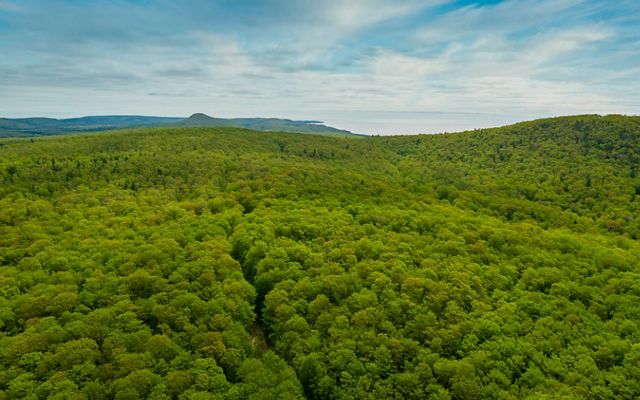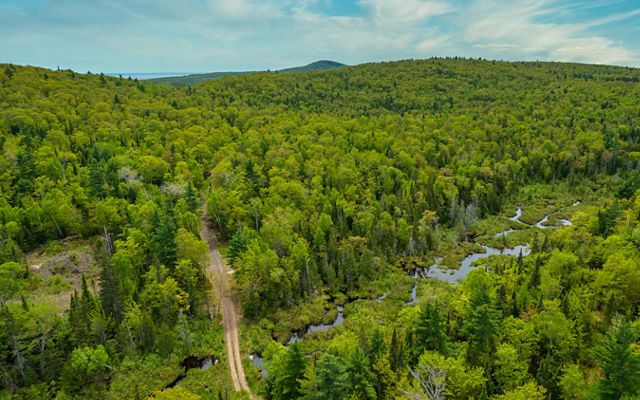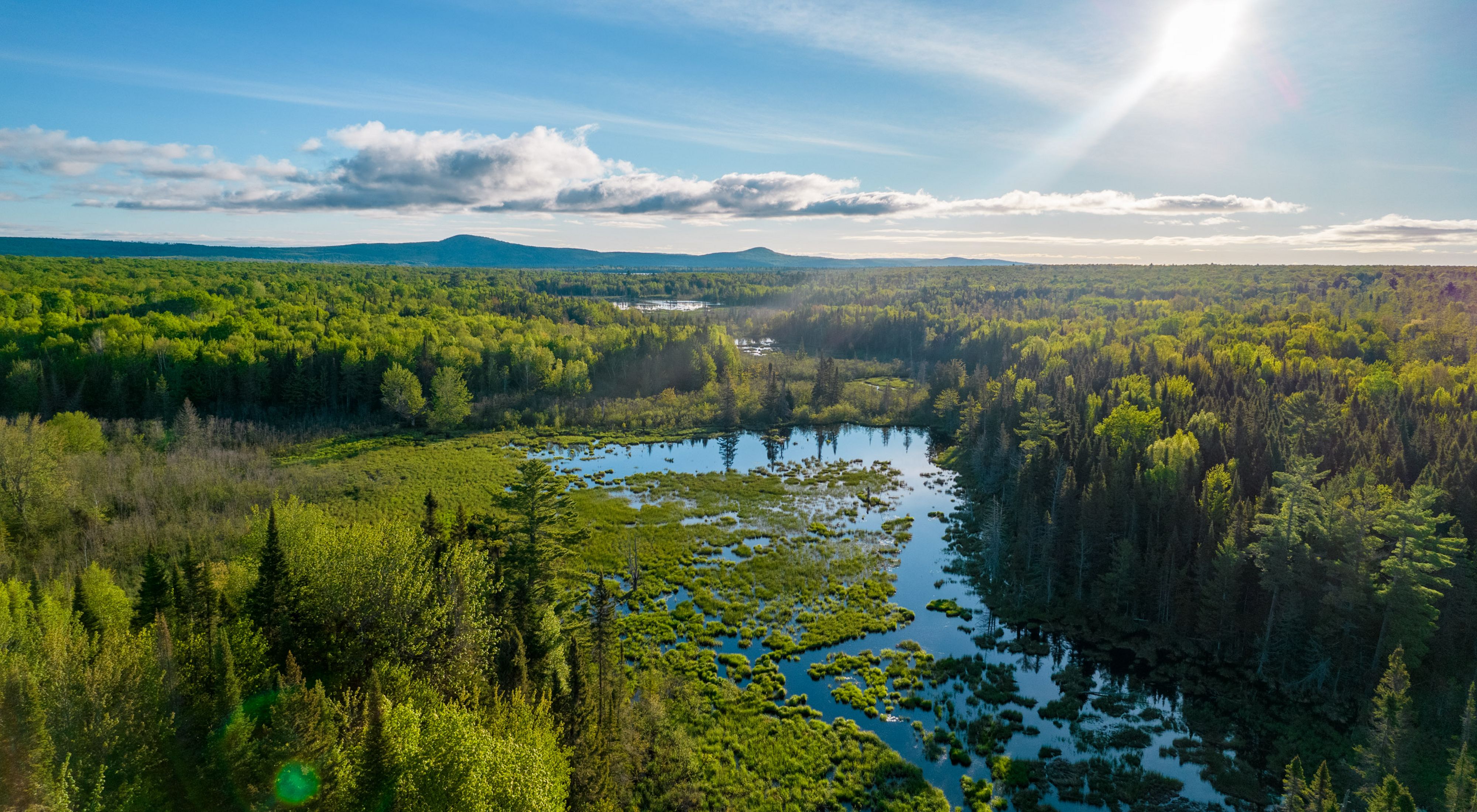The Nature Conservancy Protects More Than 31,000 Acres in the Keweenaw Peninsula
Purchase ensures land and trails remain open to the public, forests stay intact so community can thrive
Media Contacts
-
Ryan Hermes
TNC
Phone: 517-999-7745
Email: ryan.hermes@tnc.org
The Nature Conservancy (TNC)—a global conservation organization committed to building a future where both people and nature thrive—today announced it has secured the protection of more than 31,000 acres in the Keweenaw Peninsula, known as the Keweenaw Heartlands. TNC closed on the acquisition of 22,700 acres from The Rohatyn Group (TRG) and has entered into a purchase agreement for an additional 8,900 acres scheduled to close by the end of the calendar year.
This purchase ensures that everyone can enjoy and appreciate these iconic lands and waters forever and assures that sustainable management of its lush forests continues.
“The Keweenaw Peninsula is at the heart of one of the most beautiful and culturally significant landscapes in Michigan, rich with forests, wildlife, cascading rivers, lakes and wetlands,” said Helen Taylor, state director for The Nature Conservancy in Michigan. “It is an honor to partner with the local community, the State of Michigan and generous supporters to purchase these acres, protecting the land so it can be enjoyed by people for generations to come. We thank TRG for providing the opportunity to protect these lands.”
Quote: Helen Taylor

It is an honor to partner with the local community, the State of Michigan and generous supporters to purchase these acres, protecting the land so it can be enjoyed by people for generations to come.
“The Nature Conservancy is making a difference in Michigan, across the country and around the world,” said Nicolas Rohatyn, chief executive officer at The Rohatyn Group. “TNC has been a great partner in this project. We have been a proud steward of these lands for more than 15 years and are thrilled they will continue to be sustainably managed and that the public will continue to have access to it for years to come.”
Formed from one-billion-year-old lava flows and shaped by glacial ice and the waves of the largest freshwater lake in the world—Lake Superior—the Keweenaw Peninsula is one of the most unfragmented, climate-resilient forested and freshwater areas of the central United States. It is an area recognized by The Nature Conservancy as a global priority for both biodiversity and climate resiliency and as an opportunity to protect an extraordinary region for both nature and people.
“I want to thank The Nature Conservancy for engaging with community members early in this process,” said Keweenaw County Board of Commissioners Chair Don Piche. “We have a long tradition in Keweenaw County of enjoying the outdoors, and losing access to these lands would have really hurt. By listening to our needs and concerns, TNC has helped us achieve a major milestone—securing the lands. I believe I speak for most of our residents when I say we look forward to continuing to work together to develop the plan to manage and care for these lands in a sustainable way going forward.”
Quote: Don Piche
I believe I speak for most of our residents when I say we look forward to continuing to work together to develop the plan to manage and care for these lands in a sustainable way going forward.

In addition to the purchase of the Keweenaw Heartlands, TNC has secured funding to support a community visioning process, led by Rural Economic Success (RES) Associates’ John Molinaro. To date RES has conducted nearly 60 one-on-one interviews with local leaders and conducted public meetings engaging more than 300 residents; nearly 2,000 people completed surveys to express what they value most about this land.
“Outdoor recreation and the Forest Products industry are major economic drivers for the State of Michigan, including the Keweenaw Peninsula, and TNC’s purchase of this land ensures it will remain open and accessible to the public to support nature-based outdoor recreation and sustainable forestry,” said Michigan Department of Natural Resources (DNR) Director Dan Eichinger. “Much of the Keweenaw Heartlands property adjoins lands currently owned and managed by the DNR, and we look forward to working with TNC and the community to be partners in the management and use of public lands in the Keweenaw.”
Protecting the forests and water resources of the Keweenaw Peninsula also means protecting the wildlife that depend on it to survive, including gray wolf, bobcat, black bear, pine marten and migratory songbirds that fill the trees with color in the spring. The area is also a vital rest stop for migrating raptors.

“The Keweenaw Peninsula is part of the historic lands of the Keweenaw Bay Indian Community, which our families have used for hunting, fishing, gathering and ceremonial purposes for generations,” said Brigette LaPointe-Dunham, CEO of the Keweenaw Bay Indian Community. “I want to thank TNC for leading a culturally appropriate plan that protects this sacred land so it can be enjoyed and appreciated for the next seven generations.”
With the completion of the acquisition by year end, TNC will acquire the land’s mineral rights, trails and historical structures. The land will remain open to the public under the Michigan Commercial Forest Program and on community tax rolls.
“This is an exciting first step with the community in realizing its vision for the land,” Taylor said. “We look forward to supporting the efforts of community leaders, the State of Michigan and the many people who love the Keweenaw to develop a lasting, community-based plan and model to care for these lands and waters for future generations.”
The Nature Conservancy is a global conservation organization dedicated to conserving the lands and waters on which all life depends. Guided by science, we create innovative, on-the-ground solutions to our world’s toughest challenges so that nature and people can thrive together. We are tackling climate change, conserving lands, waters and oceans at an unprecedented scale, providing food and water sustainably and helping make cities more sustainable. The Nature Conservancy is working to make a lasting difference around the world in 77 countries and territories (41 by direct conservation impact and 36 through partners) through a collaborative approach that engages local communities, governments, the private sector, and other partners. To learn more, visit nature.org or follow @nature_press on X.
